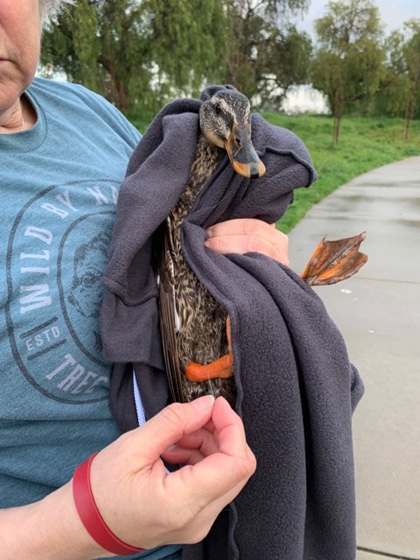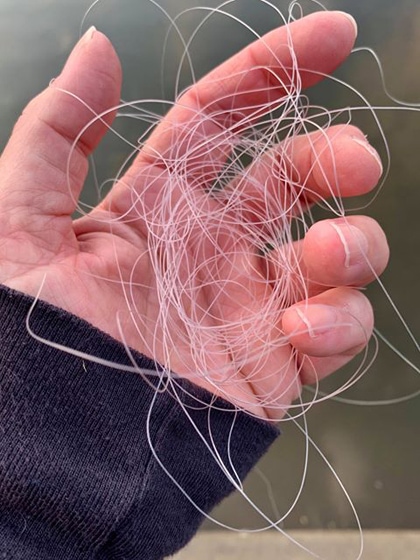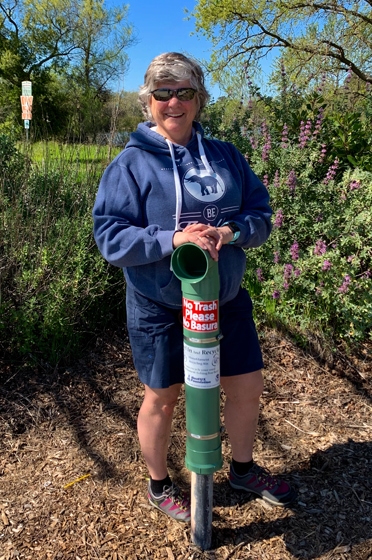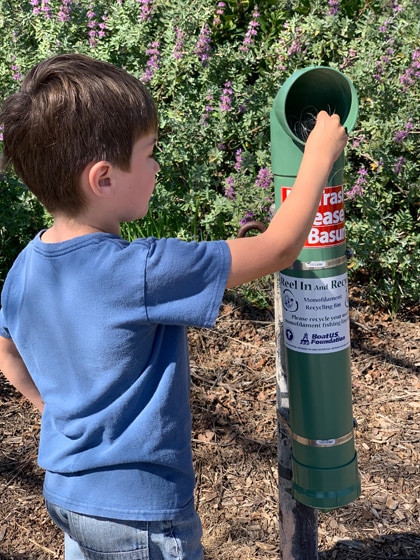Making a Difference with Monofilament Recycling
By Karen James
I spend a lot of time at Heather Farm Park watching the wildlife that lives and visits the lake, gardens and wild areas. Over the past many years, I have felt privileged to see otters, foxes, several species of ducks, cormorants, grebes, coots, hawks and other birds of prey, as well as small mammals and fish.

The Park has a fishing pond and recently I have noticed that several animals including a cormorant and a duck that have had the misfortune of encountering discarded fishing line. Unfortunately, the cormorant was hanging from a tree from the fishing line and did not survive. More recently I was able to capture a female Mallard that had line attached to one of her legs making it difficult for her to move. Fortunately she was not injured and I was able to untangle her and release her.

It was sad and disconcerting to see a cormorant hanging by its neck from discarded fishing line one afternoon while I was watching otters in the natural lake. I then became angry and decided I needed to do something to help protect our wildlife from this dangerous unseen menace. I wanted to find a way to deal with the issue of loose fishing line around the fishing pond at this park.

So I set about finding a solution to this problem. I contacted the Mt. Diablo Audubon Society who put me in touch with the Golden Gate Bird Alliance. GGBA was very helpful. They went above and beyond what I expected. They provided me with several monofilament recycling containers and the materials that went along with them. I was also put in touch with the California Coastal Commission which partners with a program called “Reel In and Recycle”. The program marks where all monofilament containers are located in California. A part of this program is collecting the line, weighing it and sending it off to a recycling facility in Iowa.

Many fishermen are passionate about the environment and know the value of preserving the places where fish and other wildlife live. Fishing organizations give tips on how to recycle fishing line, minimize fishing waste and protect the natural environment. Most marinas have fishing line recycling containers and management plans but more education and information is needed in urban parks where ponds are stocked on a regular basis. Heather Farm is a large city park and they are overwhelmed with many issues. They do not have extra staff to take on this project. So I decided that I would do this as a volunteer. With the help of my friend Anne-Lise, we found the right contacts and got permission to place the recycling containers.

It was an immediate success. It was truly wonderful how positively the fishermen responded to seeing us put up the containers and several took advantage and placed their discarded line in the bins. One fisherman said he was happy to have these placed at the park. Another fisherman showed his son how to properly dispose of loose fishing line by placing it in to the container.

My friend Anne-Lise and I will be managing this project for the time being but will be looking for volunteers to help us in the future. If you would like to volunteer please contact Karen James at tuckernatanee@comcast.net. Thank you Heather Farm Park for trusting us with this endeavor.
An avid outdoor enthusiast, Karen is a volunteer/contractor for The River Otter Ecology Project and a contractor for the Wildlife Project, currently working on a Western Pond Turtle nesting project in Martinez. She is a past volunteer for the California Least Tern Project.
